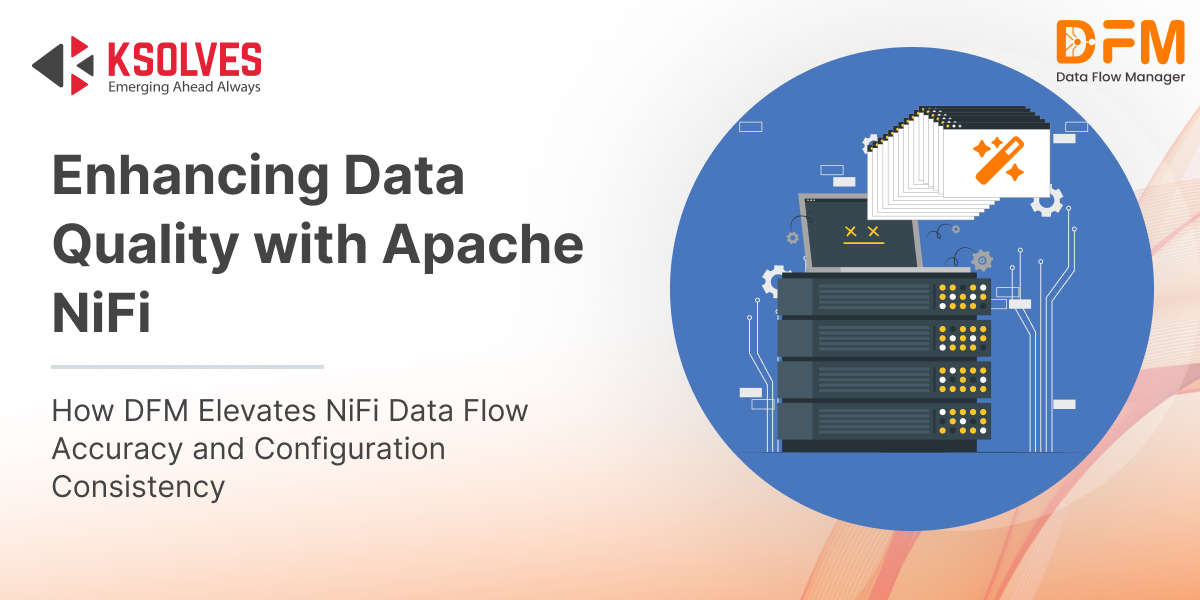How to Ensure Data Quality with Apache NiFi?
![]()

In the era of digital transformation, data has become one of the most valuable assets for organizations. However, the value of data is only as strong as its quality. Inaccurate, inconsistent, or incomplete data can significantly impact business decisions, operational efficiency, and overall performance.
Ensuring high data quality is no longer optional – it is essential.
Apache NiFi, a robust and scalable data integration tool, offers enterprises the ability to design, automate, and monitor complex data flows with ease. With its built-in capabilities for data validation, transformation, and tracking, NiFi plays a vital role in helping organizations maintain the integrity and reliability of their data.
In this blog, we’ll explore the concept and importance of data quality, delve into how Apache NiFi contributes to maintaining it, and examine how modern tools can further streamline and enhance data quality management across environments.
What is Data Quality?
Data quality refers to the overall reliability and usefulness of data based on a set of key attributes that determine its effectiveness for analysis and decision-making. These core attributes include:
- Accuracy: The data correctly represents the real-world entities or events it is intended to describe, with minimal errors or distortions.
- Completeness: The dataset includes all required values and records, without missing or incomplete information.
- Consistency: Data remains uniform across various systems, applications, and timeframes, avoiding conflicting values.
- Timeliness: Information is available and up to date when needed, ensuring relevance in fast-moving business environments.
- Uniqueness: There are no unnecessary duplicate entries; each data point is recorded only once.
Maintaining high data quality ensures that data assets can be trusted, interpreted correctly, and used effectively across business functions. Whether it’s sales transactions, customer profiles, or supply chain metrics, organizations rely on high-quality data to operate confidently and efficiently.
The Importance of Data Quality
The significance of data quality extends far beyond operational housekeeping—it is foundational to strategic growth and sustainability. Here’s why:
- Informed Decision-Making
Accurate and reliable data empowers leaders to make confident, evidence-based decisions. From financial forecasting to customer segmentation, high-quality data enables better planning and execution.
- Enhanced Customer Experience
With clean and comprehensive customer data, businesses can tailor experiences, respond to needs proactively, and build stronger relationships. Conversely, poor data quality often results in fragmented communication and lost trust.
- Regulatory Compliance
Many industries operate under strict data governance and compliance requirements. Maintaining high data quality reduces the risk of violations, audit failures, and penalties, particularly in regulated sectors like healthcare, finance, and telecommunications.
- Operational Efficiency
Data errors lead to duplicated efforts, manual corrections, and process delays. High data quality helps eliminate redundancies, improve automation, and enhance overall productivity.
- Sustainable Competitive Advantage
In a data-driven economy, quality is a differentiator. Organizations with trustworthy, integrated data are better positioned to uncover insights, drive innovation, and outperform competitors.
Apache NiFi’s Role in Ensuring Data Quality
Apache NiFi is a powerful, open-source data integration platform designed to automate and streamline the movement of data between systems. With its intuitive, drag-and-drop interface and a rich library of processors, NiFi simplifies the creation of complex data pipelines, while keeping data quality at the forefront of every flow.
Here’s how Apache NiFi plays a crucial role in maintaining and improving data quality:
1. Automated Data Validation
One of the foundational aspects of high-quality data is ensuring that only valid and expected information enters your system. Apache NiFi supports this through processors like ValidateRecord, which can automatically check incoming data against defined schemas (e.g., Avro, JSON Schema, CSV format).
By enforcing data structure, field-level validations, and data type rules at the point of ingestion, NiFi ensures that malformed or non-compliant data is immediately flagged or rerouted. Invalid records can be directed to custom failure paths for correction or auditing, thereby preventing bad data from polluting downstream systems.
2. Intelligent Data Cleansing
Raw data often comes with inconsistencies, formatting errors, typos, or extraneous values. NiFi provides a set of powerful processors—like UpdateRecord, ReplaceText, and RouteOnAttribute—to cleanse and standardize data in real time.
These processors enable teams to:
- Normalize date formats
- Correct misspellings
- Trim whitespace and unwanted characters
- Enforce standard naming conventions
- Remove or merge duplicate records (via DetectDuplicate)
The result is structured, reliable, and uniform data that’s ready for analysis or downstream consumption.
3. Contextual Data Enrichment
Quality isn’t just about accuracy—it’s also about relevance and completeness. NiFi allows you to enrich data by merging it with external sources in-flight. Using processors like LookupRecord, you can augment your data streams with reference information from relational databases, APIs, or flat files.
For example, a stream of transaction data can be enhanced with customer details or geolocation metadata before it’s stored or analyzed. This contextual enrichment transforms raw data into actionable intelligence, increasing its business value significantly.
4. Real-Time Monitoring and Proactive Alerts
Data quality is not static—it can degrade over time or fluctuate due to upstream issues. Apache NiFi provides real-time visibility into data flows, enabling teams to detect anomalies as they occur.
By leveraging built-in features like bulletins, backpressure indicators, and custom monitoring dashboards, users can:
- Track processing delays
- Flag missing or unexpected values
- Monitor throughput and latency
- Trigger alerts based on data conditions or thresholds
These capabilities ensure that quality issues are caught and addressed immediately, minimizing the risk of downstream impact.
5. Full-Traceability with Data Provenance
Perhaps one of NiFi’s most powerful features in ensuring data quality is Data Provenance, a built-in capability that allows users to trace the complete lifecycle of data across every processor and transformation step.
Whether you need to audit a record, debug a flow, or comply with regulatory mandates, NiFi provides detailed metadata about:
- Where data originated
- How and when it was modified
- What decisions or transformations were applied
- Where it moved next
This traceability promotes transparency, accountability, and trust in your data pipelines, making it easier to investigate issues and uphold quality standards across the board.
How Data Flow Manager Helps Apache NiFi Ensure Data Quality
While Apache NiFi itself is packed with features to ensure data quality, Data Flow Manager (DFM) further strengthens this capability by simplifying and standardizing the deployment and promotion of NiFi data flows across environments.
Here’s how DFM contributes to improved data quality:
- NiFi Flow Deployment and Promotion in Minutes: Data Flow Manager enables teams to deploy and promote NiFi data flows across environments without using the traditional NiFi UI. This reduces human errors and ensures that NiFi data flows are deployed exactly as designed.
- NiFi Data Flow Configuration Consistency: By automating NiFi data flow deployment, DFM ensures consistent flow configurations and parameters across all environments. This uniformity helps avoid discrepancies that could lead to data corruption or processing issues.
- Version Control & Audit Trails: DFM maintains version histories and NiFi data flow deployment logs. This allows teams to track changes, roll back when necessary, and ensure compliance, all of which support better governance and data integrity.
- Error Reduction: Automation reduces the risk of overlooked components, mismatched processors, or incorrect schema validations, key contributors to poor data quality.
Data Flow Manager acts as a quality gatekeeper, ensuring that only validated, consistent, and reliable data flows make it into production environments.
Conclusion
Data quality is not just a technical concern, it’s a strategic asset that directly influences business agility, compliance, and customer trust. Apache NiFi brings structure and intelligence to data flow management, enabling organizations to validate, cleanse, and enrich data as it moves through systems in real time.
But the story doesn’t end there. With Data Flow Manager, teams can eliminate the guesswork in NiFi data flow deployment, ensure NiFi data flow configuration consistency across environments, and lock in best practices at scale. It’s not just about moving data; it’s about moving the right data, the right way.
![]()

